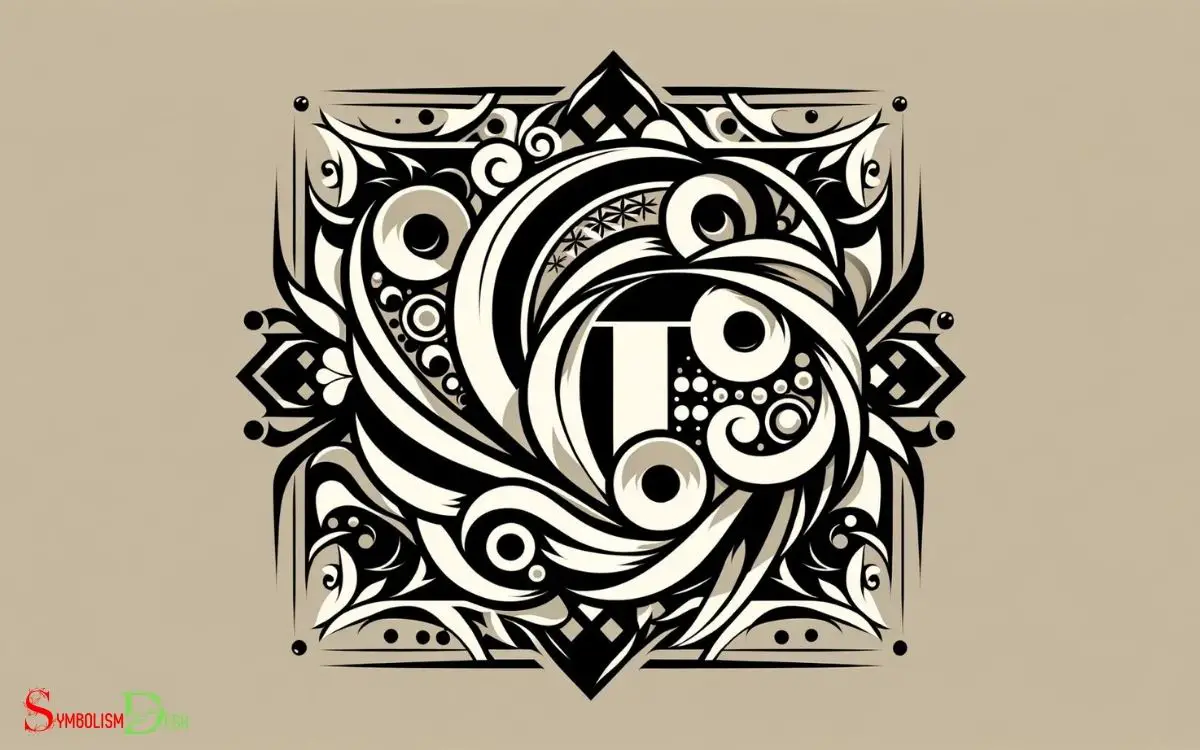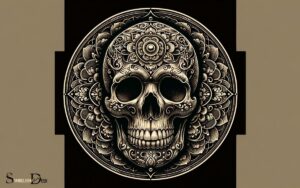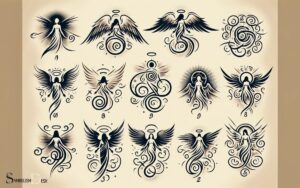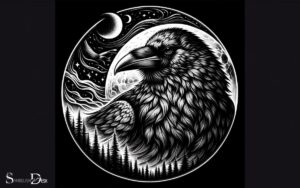German Symbols and Meanings for Tattoos: Unity!
Explore the profound symbolism of German-inspired tattoos, with icons like the Iron Cross symbolizing bravery, and Germanic Runes reflecting ancient knowledge.
These symbolic representations from German culture carry deep meanings of heritage, strength, and unity, appealing to those who admire the country’s history or seek meaningful tattoo designs.
Explanation German tattoos often incorporate symbols with historical and cultural significance.
Some of the most recognized symbols include:
- Iron Cross: A military decoration symbolizing bravery and honor, often associated with strength.
- Germanic Runes: Alphabetic signs from ancient Germanic languages that hold various mystical and magical meanings.
- Black Eagle: The national emblem of Germany, representing power, focus, and German heritage.
- Oak Leaves: Symbolizing endurance and strength, as the oak tree is known for its long-lasting nature.
By choosing these symbols for tattoos, individuals connect with the values and stories they represent.
Embrace the essence of German heritage through tattoos that reflect a deep connection to the country’s enduring symbols and values.

Key Takeaway
Iron Cross: A Symbol of Valour and Strength
The Iron Cross is a prominent German symbol representing valor and strength. It has a rich history, originally established by King Frederick William III of Prussia in 1813.
Despite its military origins, the Iron Cross has evolved to symbolize bravery and honor beyond the battlefield.
Its distinctive design, featuring an iron cross on a black background, has made it a popular choice for tattoos among those who admire its symbolism.
The Iron Cross is a powerful emblem that transcends its origins and has become a widely recognized symbol of courage and resilience.
Its enduring popularity as a tattoo design reflects its significance and the values it represents in German culture.
Oak Tree: Resilience and Endurance
Representing resilience and endurance, the oak tree holds significant symbolism in German culture. Known for its strength and longevity, the oak tree is a powerful symbol of resilience in the face of adversity.
In German folklore, the oak is often associated with the god Thor, representing protection, strength, and bravery.
The deep-rooted nature of the oak tree also signifies endurance and stability, making it a popular choice for tattoos among those seeking to convey these qualities.
In German culture, the oak tree is a reminder of the ability to weather life’s storms and remain steadfast in the midst of challenges.
For individuals considering a tattoo with German symbolism, the oak tree serves as a potent representation of resilience and endurance, embodying the spirit of overcoming obstacles and standing firm in the face of adversity.
Valknut: Norse-Germanic Connection
In Germanic culture, the Valknut symbolizes the connection between Norse mythology and Germanic traditions, embodying a sense of mystery and ancient wisdom.
The Valknut, also known as the “knot of the slain,” is often associated with the Norse god Odin and the concept of the afterlife. It consists of three interlocking triangles, and its precise meaning and significance have been the subject of much debate among historians and scholars.
Some interpret it as a symbol of the interconnectedness of the nine worlds in Norse cosmology, while others see it as representing the cycle of birth, life, and death.
Here is a table illustrating the Valknut symbol and its potential meanings:
| Symbol | Meanings |
|---|---|
| Valknut | Interconnectedness of worlds, cycle of life and death, afterlife |
The Valknut symbolizes the rich tapestry of Norse-Germanic mythology and its enduring influence on Germanic culture.
Moving on to the next topic, let’s delve into the significance of the black eagle as a representation of power and sovereignty.
Black Eagle: Power and Sovereignty
The black eagle holds a significant place in German history, symbolizing power and sovereignty. This iconic symbol is often associated with strength and resilience, making it a popular choice for tattoos among those who wish to convey a sense of authority and determination.
Understanding the historical context behind the black eagle can provide valuable insight into its enduring meaning and relevance in modern tattoo art.
Symbol of Strength
The black eagle symbolizes power and sovereignty, making it a popular choice for those seeking a tattoo that represents strength. This iconic symbol has deep historical roots, often associated with royalty, nobility, and military power.
The black eagle’s imposing presence and sharp, confident demeanor convey a sense of unwavering strength and authority.
Its piercing gaze and outstretched wings evoke a feeling of dominance and control, reflecting the inner fortitude and resilience of the individual bearing this symbol.
For many, the black eagle serves as a reminder of their ability to overcome adversity and rise above challenges, embodying the essence of inner strength.
As a tattoo, the black eagle is a striking visual representation of personal power and determination, making it a timeless choice for those seeking to express their resilience and fortitude through body art.
Historical Significance in Germany
With its historical significance in Germany, the black eagle symbolizes power and sovereignty, embodying a sense of unwavering strength and authority. The black eagle has been a prominent symbol in German heraldry since the Holy Roman Empire.
It represents the noble and fierce spirit of the German people, signifying dominance and leadership.
The eagle was adopted by various rulers and emperors throughout German history, further cementing its association with power and sovereignty. Its depiction in the coat of arms and flags of various German states reinforces its enduring significance.
Even today, the black eagle continues to evoke a sense of national pride and unity, serving as a reminder of Germany’s rich historical legacy.
For those seeking a tattoo with deep historical meaning, the black eagle is a potent symbol of strength and resilience.
Hammer and Sickle: Unity and Solidarity
A common symbol found in German tattoos is the hammer and sickle, representing unity and solidarity.
The hammer and sickle have historical significance as they were prominently used in the flag of the former German Democratic Republic. This symbol was a representation of the unity between the working class and the peasantry.
In the context of tattoos, the hammer and sickle may hold personal meanings related to solidarity with the working class, collective struggle, or a connection to socialist or communist ideologies.
It’s important to recognize that the hammer and sickle can evoke different emotions and interpretations in individuals, and its significance may vary depending on personal, cultural, and historical perspectives.
When considering this symbol for a tattoo, it’s crucial to reflect on its historical context and the intended message it conveys. When considering this symbol for a tattoo, it’s crucial to reflect on its historical context and the intended message it conveys. The healing unalome tattoo meaning often symbolizes the journey of personal growth, resilience, and overcoming challenges to reach inner peace. By choosing this design, individuals can honor their life path while embracing the idea that beauty and wisdom arise from struggles and transformation.
Teutonic Cross: Faith and Heritage
The Teutonic Cross holds significant meaning for those of German ancestry, representing a deep connection to heritage and faith.
In Germany, the cross carries religious significance and has been a symbol of the country’s cultural identity for centuries.
When considering a Teutonic Cross tattoo, individuals often seek to convey their pride in their German roots and their commitment to their faith.
Symbol of German Ancestry
One popular symbol of German ancestry is the Teutonic Cross, representing faith and heritage.
The Teutonic Cross holds deep significance for those with German heritage, as it embodies the following meanings:
- Faith: The Teutonic Cross symbolizes the strong religious beliefs of the German people, reflecting their faith and spirituality.
- Heritage: This symbol represents a deep connection to German ancestry, serving as a reminder of one’s roots and the traditions passed down through generations.
- Unity: The Teutonic Cross also signifies unity among those of German descent, fostering a sense of community and shared cultural identity.
The Teutonic Cross is a powerful emblem that resonates with individuals seeking to honor their German heritage and embrace the values it represents.
Religious Significance in Germany
When considering German symbols for tattoos, individuals may find the Teutonic Cross to hold significant religious meaning, reflecting both faith and heritage.
The Teutonic Cross, also known as the Iron Cross, has deep roots in German history and is closely associated with Christianity. It symbolizes not only the religious faith of the German people but also their cultural heritage.
The cross is a powerful representation of German identity and has been used in various contexts, including military insignia and religious iconography.
For those seeking a tattoo with religious significance, the Teutonic Cross can serve as a timeless symbol of faith and heritage.
Its clean, bold lines and distinctive shape make it a popular choice for those wishing to honor their German roots while expressing their religious beliefs through body art.
Teutonic Cross Tattoo Symbolism
A popular choice for tattoo enthusiasts seeking to express their German heritage and religious faith is the Teutonic Cross. It symbolizes both aspects with its deep historical significance.
The Teutonic Cross holds several layers of meaning:
- Faith: The Teutonic Cross represents the Christian faith of the German people, honoring their religious identity and beliefs.
- Heritage: As a symbol deeply rooted in German history, the Teutonic Cross embodies the cultural and ancestral heritage of the Germanic people.
- Strength and Resilience: The cross also signifies strength and resilience, reflecting the enduring spirit of the German nation through its tumultuous historical journey.
The Teutonic Cross serves as a powerful emblem, intertwining faith and heritage. It is a meaningful choice for those seeking to honor their German roots and religious convictions through body art.
This ties well into the subsequent section about ‘germanic runes: ancient wisdom and divination’.
Germanic Runes: Ancient Wisdom and Divination
Germanic runes hold ancient wisdom and were used for divination. These symbols, dating back to the 2nd century, were utilized by Germanic tribes for communication and magical purposes. Each rune carries its own significance and can be interpreted for guidance and insight.
The runic alphabet, known as the ‘Elder Futhark,’ consists of 24 characters, with each rune representing a specific sound or concept.
The runic symbols are believed to possess mystical powers and were often inscribed on objects for protection and empowerment.
Today, people interested in Germanic heritage and ancient symbolism often incorporate runic tattoos into their body art.
These tattoos aren’t only aesthetically appealing but also hold deep meaning for those who value the wisdom and divination associated with Germanic runes.
Conclusion
German symbols for tattoos carry deep meanings and connections to the country’s history and culture.
From the Iron Cross symbolizing valour and strength to the Valknut representing Norse-Germanic connections, each symbol holds significance and power.
So, whether you’re of German descent or simply admire the rich heritage, these tattoos offer a way to embody the resilience, unity, and wisdom of the Germanic people.
Embrace the power of these symbols and carry their stories with you.






